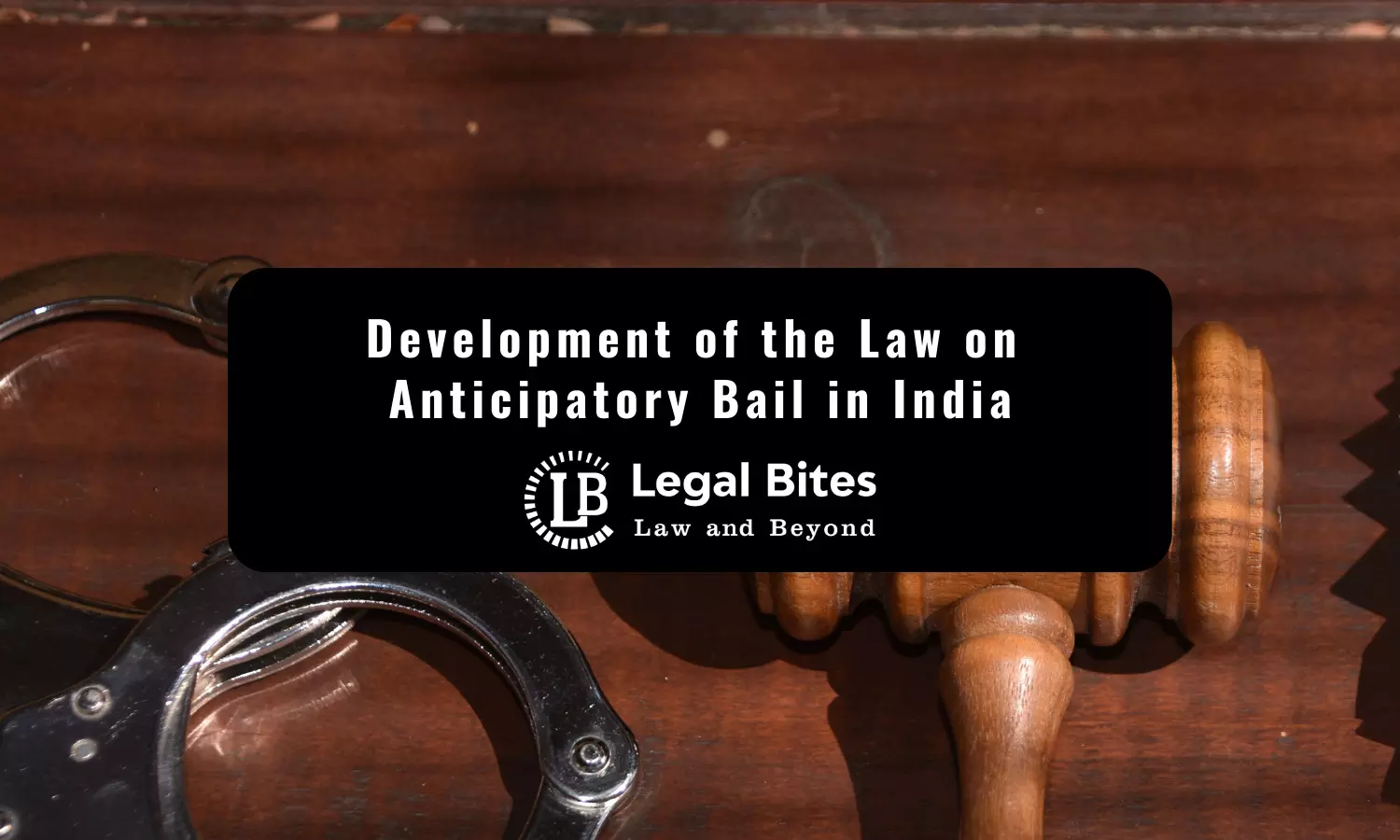Development of the Law on Anticipatory Bail in India
The article 'Development of the Law on Anticipatory Bail in India' discusses the development of anticipatory bail in India and its landmark cases.

The article 'Development of the Law on Anticipatory Bail in India' by Sukriti Verma will discuss the development of anticipatory bail in India and its landmark cases.
In general, bail means releasing a person from prison by giving some surety or bond to the legal authority, which is either the court or a professional bondsman or bonding company. The bail bond is in monetary terms and is decided by the court, from which the bail is asked, i.e., the court having the jurisdiction. Furthermore, there are conditions to bail, if those are not fulfilled, it results in the cancellation of the bail. The provisions relating to bail are in the Code of Criminal Procedure in Chapter thirty-three from sections 436 to 450.
Anticipatory Bail is granted before the arrest, unlike regular bail, which is granted after the arrest, it is defined in section 438 as "directions to a person apprehending arrest", which specifies the grounds on which the anticipatory bail shall be granted.
Introduction
"The issue of bail is one of liberty, justice, public safety and burden of the public treasury, all of which insist that a developed jurisprudence of bail is integral to a socially sensitized judicial process". - Justice V.R. Krishna Iyer
The Law Commission of India, in its 41st Report dated September 24, 1969, envisaged the requirement of introducing certain provisions in the Code of Criminal Procedure that shall enable the High Court and the Sessions Court to grant "anticipatory bail" to people in anticipation of arrest. This bail can be granted in non-bailable offences also. The idea behind this was that no one shall be kept in prison or confinement until he is proven guilty. When a person apprehends an arrest in a false case due to enmity with someone or thinks that he is going to be arrested on trump charges and thinks that some influential persons would try to get him arrested to disgrace him, he has the right to file for anticipatory bail in the Court of Session or the High Court. Another reason for the introduction of the provision of anticipatory bail was that when an accused person is not likely to abscond or misuse his powers and liberty on bail, then there is no reason to first keep him in prison for some time and only then he shall apply for bail.
But it is the court's discretion whether to grant him this bail or not. Section 438 enumerates the grounds on which the bail shall be granted, they are:
- the nature and gravity of the offence.
- the antecedents of the applicant, as to whether he has been previously convicted or not.
- the possibility of the applicant fleeing from justice.
- whether the accusation against the applicant is to humiliate him and injure him by having him arrested.
After that, a notice is sent to the Public Prosecutor and the Police Superintendent so that the public prosecutor can present his side, thereafter, the court shall determine whether an anticipatory bail can be granted or not in the presence of the applicant.
Development of the law on Anticipatory Bail in India
When the Code of Criminal Procedure came into effect in 1973, there was no provision for anticipatory bail or pre-arrest bail. This concept was discussed by various High Courts if they have any such inherent power to grant a pre-arrest bail. In the case of Amir Chand v. Crown[1], the East Punjab High court held that when a warrant has been issued against an accused but he is not yet arrested, he can appear in the court and surrender, and bail can be granted to him.
In the case of State Through A.G. v. Jagan Singh[2], the magistrate granted bail to 5 persons in the apprehension of arrest as police custody for 24 hours, and then being dragged to the magistrate would cause them grave inconvenience. There was an ongoing investigation against these 5 persons, and it is likely that they may be in arrested in the near future, therefore, after hearing the public prosecutor, the court granted them bail, as this was a pre-arrest bail it was an anticipatory bail.
Per Contra, in the case of State of M.P. v. Narayana Prasad Jaiswal[3], the High Court of Madhya Pradesh held that it is not logical to grant bail to someone who is already not in any confinement or custody, and it will be unsound to grant bail to a freeman. Furthermore, the mere registration of a case against the applicant, or any anticipation of the applicant that he is likely to be arrested is not sufficient to file a bail application before the court.
It was not until 1969, the Law Commission of India accepted the inculcation of the provision of anticipatory bail in the Code of Criminal Procedure. The report in paragraph 39.9 suggested section 497A be inserted in the Code, which would be a section on Anticipatory bail, and the report also said that this bail would be dependent upon some conditions, that will be the court's discretion to decide, as it would not be feasible to avouch straight jacket formula for the imposition of such conditions.
In the case of Shri Gurbaksh Singh Sibbia v. State of Punjab[4], it was held that the grant of anticipatory bail included a matter of fundamental rights of the people, and various sectors are demanding for the Code to be more comprehensive and more effective.
Thereafter the recommendations of the Commission were accepted by the Central Government, the govt. incorporated clause 447 in the Draft Bill of the Code of Criminal Procedure, 1970. When it was presented in front of the parliament, it was of the view that the clause shall have certain conditions enumerated under it, and it shall not be completely left upon the High Court and Sessions Court to determine such conditions, the recommendation of the Law Commission was asked for the inculcation of these commissions. The 154th Law Commission Report states some conditions that were taken into consideration by the courts while granting pre-arrest bails, that is:
- The enormity of the charge
- The nature of the accusation
- The severity of punishment
- The nature of the evidence
- The danger of the accused person if he was released on bail
- The danger of witness being tampered with
- The protracted nature of the trial
- The opportunity for the applicant to prepare his defence
- The health, age, and sex of the accused
- The nature and gravity of offence
- The position and status of accused with reference to victim and witnesses
- The probability of the accused committing more offences.
Thereafter, the Commission in its 203rd Law Commission Report of 2007 suggested many changes to be inculcated in section 438 of the Code. Such as the notice to be given to the public prosecuted in 7 days advance so that the provision is not misused by miscreants, the compulsory presence of the applicant at the final hearing, if the court thinks it to be necessary and certain conditions, such as:
(i) a condition that the person shall make himself available for interrogation by a police officer as and when required;
(ii) a condition that the person shall not, directly or indirectly, make any inducement, threat or promise to any person acquainted with the facts of the case so as to dissuade him from disclosing such facts to the Court or to any police officer;
(iii) a condition that the person shall not leave India without the previous permission of the court;
(iv) such other condition as may be imposed under sub-section (3) of Section 437, as if the bail were granted under that section.
The same was amended by the Criminal Procedure Code (Amendment) Act, 2005.
Later on, the sub-clause (4) of section 438 was added by the Criminal Law (Amendment) Act, 2018, which states that section 438 shall not apply to any arrest of any person of accusation of having committed an offence under sub-section (3) of section 376 or section 376AB or section 376DA or section 376DB of the Indian Penal Code (45 of 1860)."
Landmark Judgments on Anticipatory Bail
Hon'ble Supreme Court in the case of State of M.P v. Pradeep Sharma[5] held that
"when a person against whom a warrant had been issued and is absconding or concealing himself in order to avoid execution of Warrant and declared as a proclaimed offender in terms of Section 82 of the Code he is not entitled to the relief of anticipatory bail".
In the case of Amiya Kumar Sen v. State of West Bengal[6], the apex court that the anticipatory bail application can either be filed in the Court of Session or in the High Court, the same cannot be filed in both. Only an appeal be made to the High Court in case of rejection from the Session's Court.
In the case of Vaman Narayan Ghiya v. State of Rajasthan[7], the apex court held that mere fear and suspicion are not enough to ask for anticipatory bail.
In the case of State of MP v. Rama Krishna Balothia and Anr.[8], the apex court held that the right to take an anticipatory bail order is not a fundamental right but mere a special privilege.
In the case of Sushila Aggarwal and Others v. State (NCT of Delhi)[9], the apex Court held that the anticipatory bail does not become invalid by the start of proceeding against the accused, but remains valid until the verdict is given by the court.
Conclusion
It can be concluded that the concept of Anticipatory Bail was not there in India, in the 1950s and it was discussed, in the year 1969 in the 41st Law Commission report, from then, it never looked back and only developed more and more, certain amendments came along in the year 2005 and 2018 to make it free from misuse. Various Landmark judgments strengthened its validity and constitutionality, one such is Shri Gurbaksh Singh Sibbia v. State of Punjab. Without this provision, the liberty of many innocent people may be in danger.
References
[1] 1950 CriLJ 480
[2] 1953 CriLJ 74
[3] AIR 1963 MP 276
[4] 1980 (2) SCC 565
[5] Criminal Appeal No.2049 of 2013
[6] 1979 CriLJ 288
[7] 2013 SCC OnLine Raj 1028
[8] 1995 AIR 1198
[9] (2020) SCC Online SC 98
Important Links
Law Library: Notes and Study Material for LLB, LLM, Judiciary, and Entrance Exams


